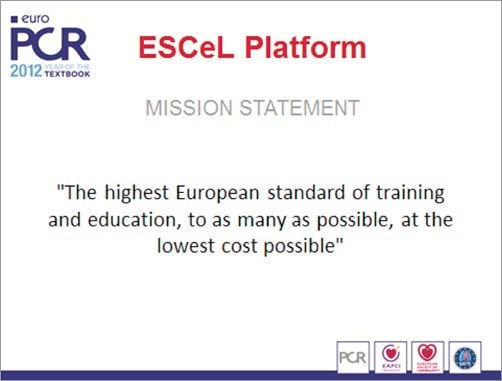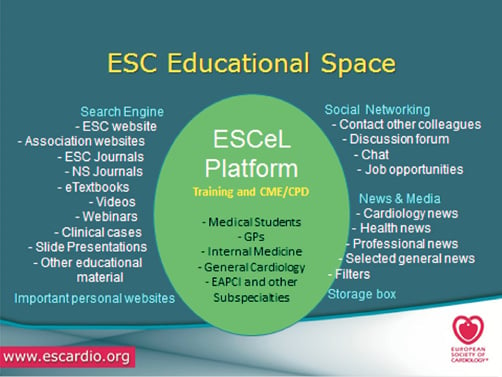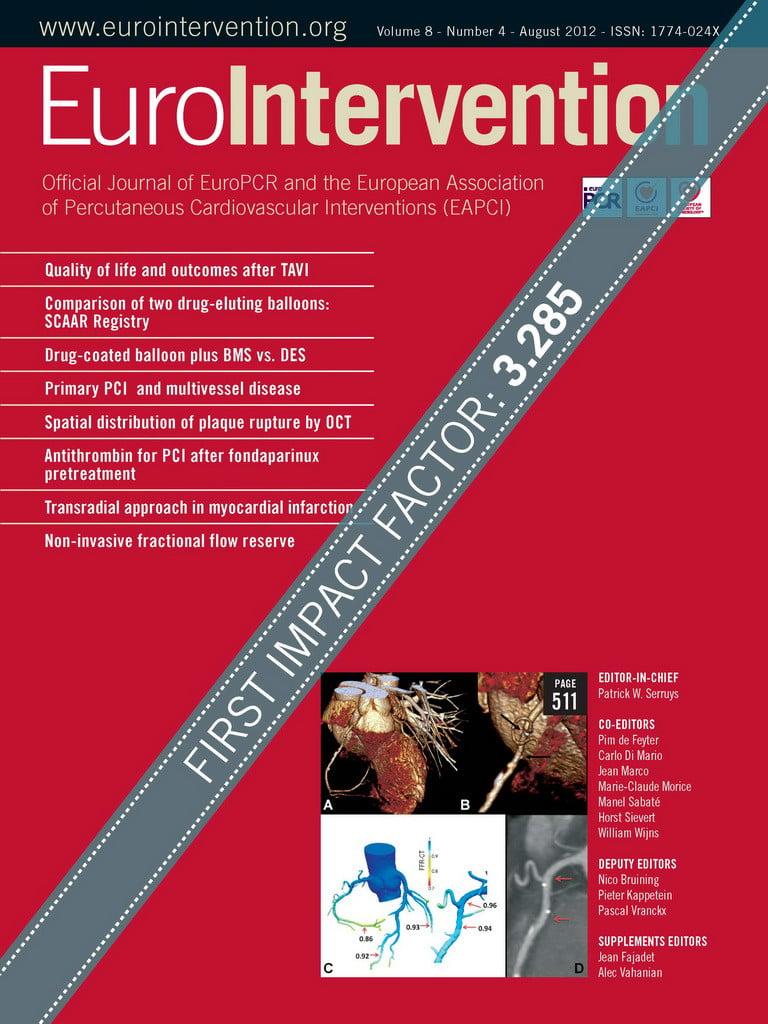As the summer of 2012 draws to a close, we are approaching a more active phase for the European Society of Cardiology’s eLearning platform. We have spoken of this many times, explaining how the EAPCI is playing a leading role in content for this innovative new program which should prove itself to be of the greatest value to all our community as it develops over the next few years. We have invited Lino Goncalves, Chairperson of the ESC committee on the ESCeL Platform and Martine Gilard, the EAPCI representative to this committee, to comment on the current status of what promises to be the future benchmark in cardiovascular education Figure 1 and Figure 2.

Figure 1. From Martine Gilard’s presentation at EuroPCR 2012.

Figure 2. The European Society of Cardiology’s integrated approach with the ESCeL Platform at the centre.
Knowledge assessment
After years of preparation, the ESCeL Platform is now ready to receive the educational materials that will best fit the EAPCI core curriculum. As the basis for this new adventure in knowledge assessment, the EAPCI Board, after obtaining the agreement of Europa Organisation, has chosen to use various chapters from two textbooks published by its subsidiary Europa Edition: “Coronary stenosis imaging, structure and physiology” and “Percutaneous interventional cardiovascular medicine”. From these two books, 78 chapters have been selected and will now add their weight and presence to this first version of the ESCeL Platform.
After the launch of the EAPCI/ESCeL Platform at the ESC Congress in Munich, we expect that the national interventional cardiology groups will begin to actively participate in this project by starting to produce their own high standard original educational materials based on the EAPCI core curriculum topics and guidelines. Educational material produced with this goal in mind must be created in strict conformity with the instructions developed for the EAPCI/ESCeL Platform which can be found online at the EAPCI website (www.escardio.org/communities/EAPCI). Before being uploaded onto the Platform by the ESCeL back office, all educational products need to be approved by the EAPCI Educational and Training Committee. The authors of these educational materials, as well as the affiliated national interventional groups where they are produced, will have their names posted on the ESCeL Platform itself. All this material will then be used as a basis for the ESCeL Platform’s knowledge assessment program.
Some of the topics and chapters will be mandatory (e.g., guidelines or textbook chapters) and others will be optional. In the future, trainees will be asked to complete a specific number of credits for each one of the EAPCI core curriculum topics. Obtaining these credits will be an important first step and must be achieved in order to pass the knowledge assessment exam. Passing this exam, along with passing the skills and professionalism assessment as well, will allow the candidate to receive a final certificate stating that the trainee has successfully completed a professional training of excellence.
A group of dedicated volunteers are now producing the multiple choice questions (MCQs) needed for the formative knowledge assessment of this first version of the Platform. These MCQs are produced according to the most relevant learning objectives found in the educational materials. Some of the MCQs will be public, and will be uploaded directly on the ESCeL Platform. If a trainee does not respond correctly to a specific question, he or she will be allowed to study again the related subject matter and try once more to correctly complete the same MCQ. This is important in order to ensure that the most relevant points of each of these educational materials will not be missed by the trainee. Other MCQs will be stored in a secure database, and will not be made public. These special MCQs can be used for future summative (pass or fail), exams if a decision is taken in that direction at the European or national level.
ESCeL Platform, what it means for the EAPCI
A uniform, user-friendly environment with a reduced cost, the ESCeL Platform will in no way reduce the role of EAPCI in the training process. While trying to harmonise some areas of training and education across different subspecialties and within Europe, the Platform’s goal is - above all - to provide a tool and service while maintaining the overall autonomy of the different subspecialties, working groups and national societies. Without question, it remains the role of the EAPCI to define the procedures and content according to our association’s needs and strategies.
Today an effort is underway to encourage individuals to speak about this project at the national level, identifying key players and issues, eventually preparing the national associations to produce and translate the educational projects that are accepted and developed. Much still needs to be done in terms of identifying and communicating to those groups who could be most interested by the Platform: speaking on a local level to trainees or young cardiology networks, as well as encouraging volunteers to work to further the Platform in terms of educational material and the development of MCQs
Education designed today for tomorrow
The ESCeL Platform, and the EAPCI’s participation in it, is fundamental to the creation of a long-term educational foundation in cardiovascular education in Europe. This is as valid and necessary today as it will be in the years to come. Our Association’s participation in such a project - from its very inception - only further underlines our central philosophy and commitment to improve our ability to educate our members and offer our patients the highest standard of care. Join us, work with us and help us build, together, this exciting new educational tool, the ESCeL Platform.

